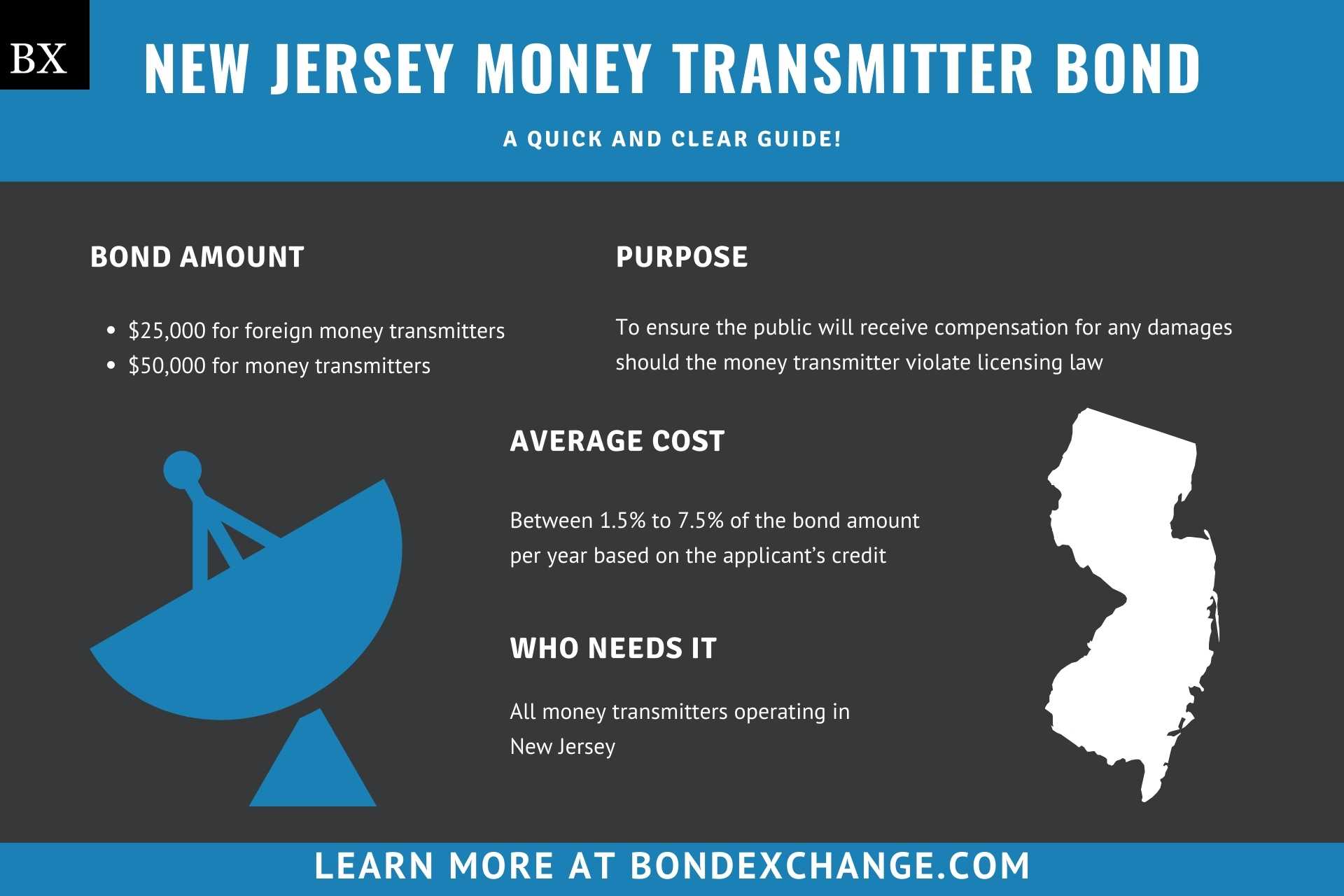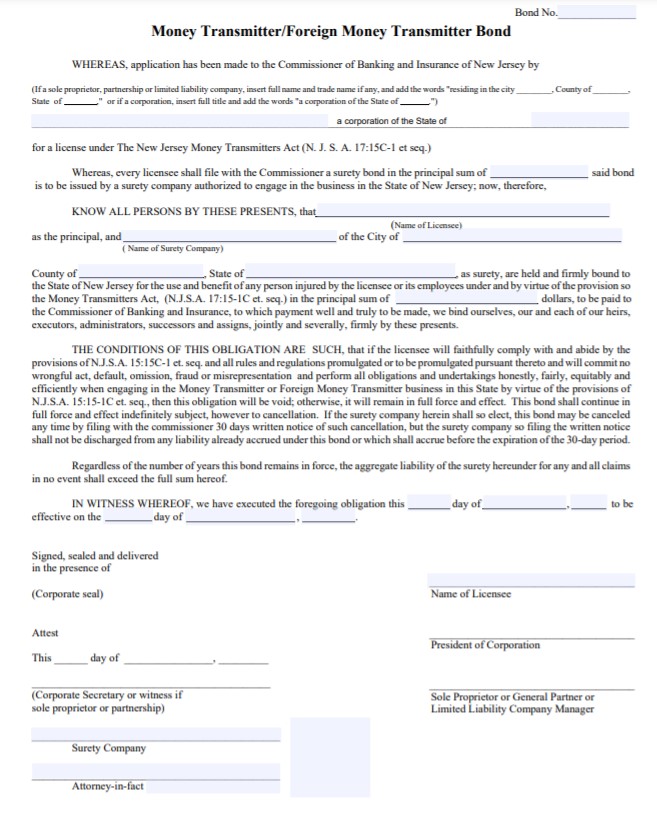New Jersey Money Transmitter Bond: A Comprehensive Guide
July 27, 2021

This guide provides information for insurance agents to help their customers obtain New Jersey Money Transmitter Bonds
At a Glance:
- Average Cost: Between 1.5% to 7.5% of the bond amount per year based on the applicant’s credit
- Bond Amount:
- $25,000 for foreign money transmitters
- $50,000 for money transmitters
- Who Needs it: All money transmitters operating in New Jersey
- Purpose: To ensure the public will receive compensation for any damages should the money transmitter violate licensing law
- Who Regulates Money Transmitters in New Jersey: The New Jersey Department of Banking and Insurance
Background
New Jersey statute 17:15C-4 requires all money transmitters operating in the state to obtain a license with the Department of Banking and Insurance. The New Jersey legislature enacted the licensing laws and regulations to ensure that money transmitters engage in ethical business practices. In order to provide financial security for the enforcement of the licensing law, money transmitters must purchase and maintain a surety bond to be eligible for licensure.
What is the Purpose of the New Jersey Money Transmitter Bond?
New Jersey requires money transmitters to purchase a surety bond as part of the application process to obtain a business license. The bond ensures that the public will receive compensation for financial harm if the money transmitter fails to comply with the regulations set forth in the New Jersey statutes 17:15C. Specifically, the bond protects the public in the event the money transmitter engages in any acts of fraud or fails to transmit all money owed to consumers. In short, the bond is a type of insurance that protects the public if the money transmitter breaks licensing laws.

How Can an Insurance Agent Obtain a New Jersey Money Transmitter Bond?
BondExchange makes obtaining a New Jersey Money Transmitter Bond easy. Simply login to your account and use our keyword search to find the “money” bond in our database. Don’t have a login? Enroll now and let us help you satisfy your customers’ needs. Our friendly underwriting staff is available by phone (800) 438-1162, email or chat from 7:30 AM to 7:00 PM EST to assist you.
At BondExchange, our 40 years of experience, leading technology, and access to markets ensures that we have the knowledge and resources to provide your clients with fast and friendly service whether obtaining quotes or issuing bonds.
Is a Credit Check Required for the New Jersey Money Transmitter Bond?
Surety companies will run a credit check on the owners of the money transmission company to determine eligibility and pricing for the New Jersey Money Transmitter bond. Owners with excellent credit and work experience can expect to receive the best rates. Owners with poor credit may be declined by some surety companies or pay higher rates. The credit check is a “soft hit”, meaning that the credit check will not affect the owner’s credit.
How Much Does the New Jersey Money Transmitter Bond Cost?
The New Jersey Money Transmitter Bond can cost anywhere between 1.5% to 7.5% of the bond amount per year. Insurance companies determine the rate based on a number of factors including your customer’s credit score and experience. The chart below offers a quick reference for the approximate bond cost on a $50,000 bond requirement.
$50,000 Money Transmitter Bond Cost
| Credit Score | Bond Cost (1 year) |
|---|---|
| 800+ | $750 |
| 650 – 799 | $1,000 |
| 600 – 649 | $2,000 |
| 550 – 599 | $3,750 |
How Does New Jersey Define “Money Transmitter?”
New Jersey statute 17:15C-2 defines a money transmitter as any business entity who provides one or more of the following services:
- Sells or issues payment instruments
- Transmits money within the United States or to locations abroad by any and all means, including but not limited to payment instrument, wire, facsimile, electronic transfer, or otherwise for a fee, commission or other benefit
- Receives of money for the purpose of paying a consumer’s bills, invoices or accounts
Foreign money transmitters solely engage in the business of transmitting money to locations outside of the United States.
How do Money Transmitters Apply For a License in New Jersey?
Money transmitters in New Jersey must navigate several steps to secure their license. Below are the general guidelines, but applicants should refer to the application form for details on the process.
License Period – The New Jersey Money Transmitter License expires on June 30 of every odd numbered year (2023, 2025 etc) and must be renewed before the expiration date
Step 1 – Meet the Net Worth Requirements
Applicants for the New Jersey Money Transmitter License must have a minimum company net worth (assets – liabilities) of at least:
-
- Money Transmitter: $100,000 plus an additional $25,000 per authorized agent to a maximum requirement of $1 million
- Foreign Money Transmitter: $50,000 plus an additional $10,000 per authorized agent to a maximum requirement of $400,000
Applicants must submit an audited financial statement, prepared by a CPA, verifying their net worth when submitting their license application.
Step 2 – Purchase a Surety Bond
Money transmitters must purchase and maintain a surety bond with the following limit:
-
- $25,000 for foreign money transmitters
- $50,000 for money transmitters
Step 3 – Complete the Application
All New Jersey Money Transmitter License applications must be mailed to the following address:
NJ Department of Banking and Insurance
Licensing Services Bureau
P.O. Box 473
Trenton, NJ 08625
Money transmitters must complete the application in its entirety, and submit the following items:
-
- Audited company financial statements prepared by a CPA
- Company formation documents
- Personal Certifications and 2 X 2 passport style photos of all company owners with a 10% interest or higher
- All filings made with the Securities and Exchange Commission or related government agencies
- List of foreign countries money is transmitted to (if applicable)
- Letters from all clearing banks used confirming the company’s payment instruments will be drawn from there
- Sample contract used with authorized agents (if applicable)
- Sample payment instrument (if applicable)
- Detailed description of the company’s corporate structure
- Detailed description of the business activities that will be performed
- Full list of all authorized agents
Money transmitters must pay a license fee based on the type of license being applied for, as referenced in the table below:
| License Type | License Fee |
|---|---|
| Insurance Premium Finance Co | $500 |
| Non-Profit Debt Adjuster | $300 |
| Foreign Money Transmitter | $700 |
| Money Transmitter | $700 |
| Home Finance Agency | $400 |
How Do New Jersey Money Transmitters Renew Their License?
Money transmitters will be mailed renewal instructions on April 1 of the year in which their license expires. Money transmitters should mail their completed renewal application to the following address:
NJ Department of Banking and Insurance
Licensing Services Bureau
P.O. Box 473
Trenton, NJ 08625
The New Jersey Money Transmitter License expires on June 30 of every odd numbered year (2023, 2025 etc) and must be renewed before the expiration date.
What Are the Insurance Requirements for the New Jersey Money Transmitter License?
New Jersey does not require Money Transmitters to purchase any form of liability insurance as a prerequisite to obtaining a business license. Money transmitters must purchase and maintain a surety bond with the following limit:
- $25,000 for foreign money transmitters
- $50,000 for money transmitters
How Do New Jersey Money Transmitters File Their Bond?
Money transmitters should mail the completed bond form, including the power of attorney, to the following address:
NJ Department of Banking and Insurance
Licensing Services Bureau
P.O. Box 473
Trenton, NJ 08625
The money transmitter surety bond requires signatures from both the surety company that issues the bond and a representative from the money transmission company. The surety company should include the following information on the bond form:
- Name and state of incorporation of entity/individual(s) buying the bond
- Surety company’s name and state of incorporation
- Bond amount
- Date the bond is signed
- Date the bond goes into effect
What Can New Jersey Money Transmitters Do to Avoid Claims Against Their Bond?
To avoid claims on their bond, money transmitters in New Jersey must follow all license regulations in the state, including some of the most important issues below that tend to cause claim
- Do not engage in any acts of fraud
- Do not breach any contracts made with consumers
- Pay all money owed to consumers
What Other Insurance Products Can Agents Offer Money Transmitters in New Jersey?
New Jersey does not require money transmitters to purchase any form of liability insurance as a prerequisite to obtaining a business license. However, most reputable businesses will seek to obtain this insurance anyway. Bonds are our only business at BondExchange, so we do not issue liability insurance, but our agents often utilize brokers for this specific line of business. A list of brokers in this space can be found here.
How Can Insurance Agents Prospect for New Jersey Money Transmitter Customers?
New Jersey conveniently provides a public database to search for active money transmitters in the state. The database can be accessed here. Contact BondExchange for additional marketing resources. Agents can also leverage our print-mail relationships for discounted mailing services.

